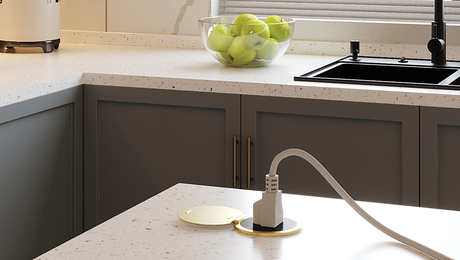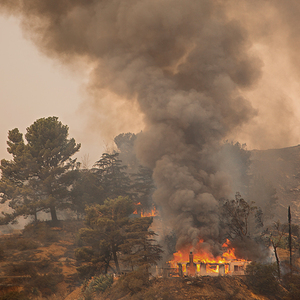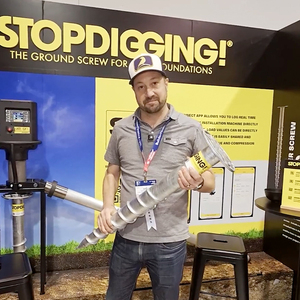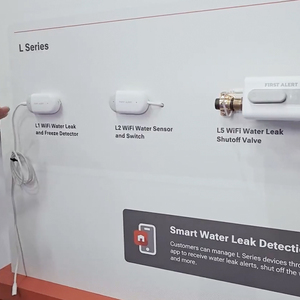I’m need to provide some grounded outlets in my home built in 1949 before such things existed for sensitive things like computers and other electronics. So I don’t need to do the entire house, just a few select spots. I have a new grounded service box etc and have done quite a bit of new service rewiring in the basement and into the garage where I have a shop. New wiring is fairly straightforward.
The question I have now is can’t I just run a insulated 14g wire from a water pipe(the copper pipe is continuous and is used as part of the ground system in the house along with ground rods)to the boxes i need to work on and install a new receptacle? The wiring is old romex. Do I need to ground the box as well? The old box gets kinda crowded with all of that new wire in there and eliminating the pigtail to the box would help. Anything else I need to do?
Discussion Forum
Discussion Forum
Up Next
Video Shorts
Featured Story

A new code-compliant, spill-safe outlet from Legrand offers a sleek solution for a kitchen island plug.
Featured Video
How to Install Cable Rail Around Wood-Post CornersHighlights
"I have learned so much thanks to the searchable articles on the FHB website. I can confidently say that I expect to be a life-long subscriber." - M.K.
Fine Homebuilding Magazine
- Home Group
- Antique Trader
- Arts & Crafts Homes
- Bank Note Reporter
- Cabin Life
- Cuisine at Home
- Fine Gardening
- Fine Woodworking
- Green Building Advisor
- Garden Gate
- Horticulture
- Keep Craft Alive
- Log Home Living
- Military Trader/Vehicles
- Numismatic News
- Numismaster
- Old Cars Weekly
- Old House Journal
- Period Homes
- Popular Woodworking
- Script
- ShopNotes
- Sports Collectors Digest
- Threads
- Timber Home Living
- Traditional Building
- Woodsmith
- World Coin News
- Writer's Digest


















Replies
You CAN do what you are proposing, if the pipes provide a good path back to the service equipment, but it isn't an approved method of grounding. Also, the box must be grounded, so a short-circuit will trip the breaker. Otherwise, a short will energize the box, and sit there waiting for you to touch it.
I would run new cables from the distribution panel to the locations where grounded receptacles are needed. That way, the system will work properly, and it will not give an inspector the opportunity to say "that ain't right".
Bob
It is not legal to run the ground to a water pipe. That is an old method, but because of the possibility of the pipe being changed in the future with plastic it is no longer used.
What is legal is to run a separate wire that does go back to the ground in the box. Either directly or to the ground in in some of the new wiring that you have done.
If you look at some of the better quality recptacles you will find some that have bronze spring "fingers" under the area where the mounting screws go. Those are used to ground the box via the recptacle so it simplifies the wiring a little.
Lets play a game of imagine this.
You run your ground wires to the nearest water line. Some time later you plug in an old refrigerator. The refrigerator leaks current to its frame through damaged insulation and moisture from condensation. This isn't a problem because the current drains away through your ground connection. The ground connection is much better than you are when leaning on the sink while opening the fridge door so you don't get shocked. Everyone is happy.
Years later you, being prosperous, you install a spa in your bathroom. The plumber wants to tee off the line to feed your spa. As it happens the point he plans to install the tee in is between the ground connection for your refrigerator and the main ground connection between the electrical panel and plumbing.
He crawls under your house after turning off the water and proceeds to cut the line. The pipe parts and water pours out. The plumber fails to see the tiny spark. Wanting to check the fit the plumber grabs both ends of the pipe with wet hands. As soon as he gets his hands on each pipe his hands, without being ordered, grab the pipe in a death grip. He can't let go.
As the current flows from hand to hand it breaks down the normal resistance of the human body. As the resistance goes down the current goes up. Along the current path cells are overheating and bursting. He is being cooked from the inside out.
Our plumber thrashes and screams in a confined space. If he is lucky he just might kick himself free before his heart stops. Otherwise all I can say is well done.
Metallic plumbing must be grounded to drain any stray currents that might get on it. From for example: a defective electric water heater element. The ground system should drain current FROM the plumbing not drain current TO the plumbing. Plumbing should be protected by the ground system. The plumbing should not be part of the ground system within the house. Ideally there should be only one ground connection to the plumbing and it should be within 5' of where the plumbing first enters the house.
This has come up before on this board. There was a plumber who said he survived exactly the kind of electrically hot copper pipe situation that 4Lorn1 describes. Now he uses car battery jumper cables to bridge any copper pipe he opens up. Current code says exactly one electrical ground connection to the plumbing, within 5 feet of where the water line enters the building. So, do it that way.
-- J.S.
John,
Code says that if you're using an underground metal water pipe as the primary grounding electrode, you have to attach the grounding electrode conductor within five feet of where the pipe enters the building.
If the pipe is not serving as a grounding electrode, then you may attach the bonding jumper (the wire from the pipe to the ground/neutral at the service point) anywhere on the pipe. This is pretty common in my area--the water supply pipe is plastic, and after it emerges from the ground, copper piping is used. I secure the bonding jumper to the pipe at the water heater in the garage. I also bond the gas pipe there too. Inspectors like it just fine.
Let me know if you want Code section references.
Cliff
Thanks -- That'll save me about a 40 foot run of ground wire for my replacement service.
-- J.S.